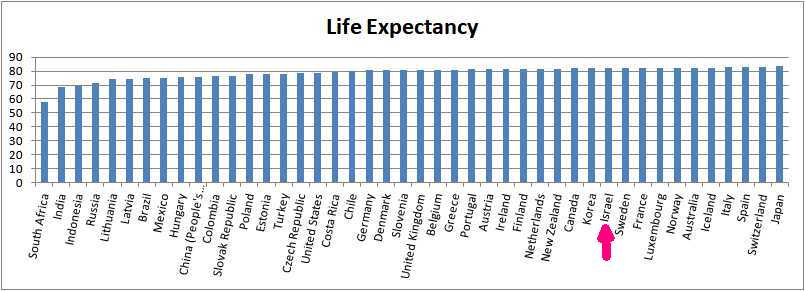According to a recent report of the Organization for Economic Cooperation and Development (OECD) as reported by the Isareli Ministry of Health, Israel spends significantly less than most of the member countries, but its health results are among the best including life expectancy that is among the highest and one of the lowest infant mortality rates.
Israel spends 7.3% of its GDP on health compared to the average OECD country spending 8.9% of its GDP. Israel is ranked 27th in its level of expenditure out of the 35 member countries.
It has fewer hospital beds (2.3 per thousand people) compared to an average of 3.6 per thousand, and it only has 4.9 MRI machines per million residents compared to an average of 15.8 per million. Only two countries had a lower number. There are an average of 36 MRI tests per thousand compared to an OECD average of 64. In CT exams, Israel is about average at 136 per thousand compared to an overall 145 per thousand.

Despite these low expenditure levels, Israel seems to get more results per unit of expense. Life expectancy in Israel is two and a half years higher than the OECD average for men (80.7 compared to 78.1), which is the fourth highest overall. In women the advantage is narrower at 84.2 compared to an OECD average of 83.4. This is 12th among all OECD countries.
Infant mortality is lower than the average at 3.1 per thousand compared to 3.8, and the suicide rate is much lower at 4.1 per 100,000 compared to 12.4 in the overall OECD. Israel's rate is the second lowest of all.

Israel's fertility is by far the highest in the OECD at an overall 3.1 births per woman. South Africa, in second place, is only 2.5 births per woman. The overall fertility in the OECD is only 1.7 births per woman, well below the level needed to sustain a stable population (2.1).
The number of students who have completed basic medical education in Israel was only 6.8 per thousand, compared to an overall average of 12.1 per thousand. This does not count the many Israelis who leave Israel to study medicine and then return home to practice.




